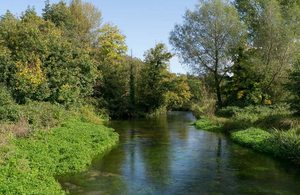Water companies challenged to improve environmental performance
Water company chiefs challenged on environmental performance, leakage and protecting supplies.

The chief executives of fifteen water companies met today (8 September) with Environment Minister Rebecca Pow, who challenged them to do more to protect the environment and safeguard our water supplies.
Representatives from Ofwat, the Environment Agency, Natural England, Water UK, The Consumer Council for Water (CCWater) and the Drinking Water Inspectorate (DWI) were also present.
The meeting follows the joint letter sent to water companies in July, encouraging them to accelerate investment as part of the country’s green economic recovery from coronavirus.
While water companies had coped well under increased pressure during lockdown, Minister Pow made clear that much stronger action was needed on environmental priorities, particularly in the following areas:
-
Storm overflows: The volumes of sewage discharged into rivers and other waterways in extreme weather must be reduced. A new Taskforce has been set up between Defra, the EA, Ofwat and Water UK which will meet regularly and set out clear proposals to reduce the frequency and volumes of these incidents. The Environment Bill will also allow government to set legally binding wastewater targets.
-
Chalk streams: Chalk streams – known for their clear waters and rich wildlife – continue to be at risk due to low flows, poor water quality and unsustainable abstraction by water companies. The Minister urged water companies to significantly raise their ambition to improve chalk stream catchments and asked them to join her at a Chalk Stream summit she will host on 16 October.
-
Water resources and leakage: While improvements on leakage rates have been made, the Minister reiterated the government’s expectation for leakage rates to be halved by 2050. A new national framework was published in March 2020 by the Environment Agency setting out the scale of action needed to safeguard our water supplies for the future, requiring collective action from government, water companies, businesses and the general public.
Today’s meeting comes ahead of the Environment Agency’s annual report on water companies’ environmental performance, which will be published later this month.
Environment Minister Rebecca Pow said:
“Water companies need to take their environmental obligations seriously and this impetus must come from the top.
“Despite investment from the industry, the damage inflicted on our environment – our rivers, lakes, streams and the wildlife that rely on them – is still far too great. Today we discussed a number of issues I feel strongly about, including storm overflows, and how we can work together to see much more ambitious improvements.
“This country’s green recovery from coronavirus can only happen if water companies step up and play their part.”
Harvey Bradshaw, Executive Director of Environment and Business at the Environment Agency, said:
“Our water environment is precious and under huge and increasing pressure from a growing population and the climate emergency.
“Our environmental targets are ambitious and we are challenging water companies to go faster and further on environment, leakage and protecting supplies. Water companies have a key role to safeguard our water environment and we will regulate them as a modern regulator should; rewarding excellence and sanctioning behaviour that harms the environment. In this way we will be working with them to drive up standards including through our new Taskforce on storm overflows.
“Everybody shares a crucial responsibility to protect the environment for future generations, and we will continue to work with all parties to deliver much-needed improvements.
John Russell, Senior Director, Strategy and Planning at Ofwat, said:
“We welcome the challenge to water companies set by Minister Pow and are committed to continuing to work with government and other independent regulators on the future direction for the water industry, particularly the focus on environmental priorities. These sector wide discussions are crucial for setting targets which can drive long term resilience and broader improvements to water customers, such as the progress water companies are reporting on leakage and the industry’s pledge to achieve net zero by 2030.”
The meeting also touched on changes to the £5 billion Water Industry National Environment Programme (WINEP) – investment by water companies in the environment – to make it more outcome-focused and increase the involvement and accountability of water companies.